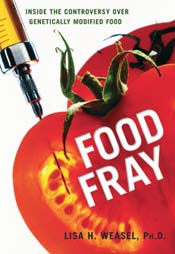Title: Food Fray: Inside the Controversy Over Genetically Modified Food
Author: Lisa H. Weasel
Genre: Nonfiction
Year: 2009
Acquired: From the publisher for review consideration.
Rating: 




Review: The thing I remember most clearly about Food Fray by molecular biologist Lisa H. Weasel is that it made me both curious about and angry with Monsanto, a “U.S.-based multinational agricultural biotechnology corporation” (thanks, Wikipedia), that seems to have it’s tentacles in everything I love to eat.
From previous food reading, I knew Monsanto was a bit shifty, but the company has really exceeded my expectations: patenting genetically modified foods then suing family farmers after those genetically modified seeds happened to pollinate their corn and pushing for a ban on labeling modified milk. Monsanto is messing with milk, and I love milk!
Anyway, if any of what I just wrote seems interesting, then you may enjoy Food Fray. The book is a short history of genetically modified foods — foods that have only been around for the last decade or so — that does a great job of tying together the science and the politics of how and why food is the way it is. The book starts with with the history of the debate, the rise of “Frankenfood” in Europe, the challenges and benefits of biotech’s effort to save the world, and what the future of genetically modified food might hold. I thought Weasel was relatively balanced about the issues and gives a thorough overview for newbies like me.
In general, I thought Food Fray was a bit dry. It’s not the kind of nonfiction that I’d recommend if the topic sounds boring to you, but it is the kind of book that teaches a lot about an issue in a manageable package. So if genetically modified food sparks your interest, then I recommend giving the book a try. Fair warning, it will probably make you really, really dislike Monsanto, or at least wish you could know all of what exactly they’re up to.
Other Reviews:
If you have reviewed this book, please leave a link to the review in the comments and I will add your review to the main post. All I ask is for you to do the same to mine — thanks!


Comments on this entry are closed.
I’ve read similar books – I love to read them but at the end I always have a feeling that I simply have not choice but to “take it”, as if there is no way to win. Either grow my own food of suck it up.
http://www.ManOfLaBook.com
Man of la Book: Yeah, that’s a bit how I felt too. Unless you can take control of all your food, it’s hard to make decisions like that. But it’s still good to know about.
A friend of mine grew up in a rural community dominated by Monsanto. She taught me a lot about their practices, but I could learn more–especially since I’m trying to be more conscious of my food. Sounds like this could be a good place for some answers, even if it is a bit dry.
Memory: I think this book is a good overview of the issue — it gives some history and current issues. Monsanto isn’t the only topic, but comes up pretty frequently.
I love this specific genre of book and finding out about the “shiftiness” of the food industry. Food Inc, The Omnivore’s Dilemma, anything Pollan has written – I love it! I’ll definitely have to look into this book!
Miss Remmers: I think this book is a little more dry than The Omnivore’s Dilemma, but along the same vein. I haven’t read/watched Food Inc, but it’s on my list. Boyfriend and I have had it in our Netflix queue forever.
This sounds like the nonfiction counterpart to a novel I read some years ago, Ruth Ozeki’s All Over Creation. Her characters talk a lot about genetically modified vegetables in there, mostly potatoes, because it’s set in Idaho. I also like her earlier novel, My Year of Meats.
Jeanne: Interesting! It hadn’t really occurred to me that there would be fiction taking on these issues, but I guess fiction takes on all sorts of issues and so I shouldn’t be that surprised.
Monsanto gives me the twitches after the other food science books I’ve read. Now I must decide whether this would make me appropriately angry or irrationally angry.
Jen: If you know food science already, then I’m not sure how much this book would necessarily add. I felt like it was more of an overview/history of genetically modified foods. I think it made me the appropriate amount of angry, but also sort of sad since there seems like there is so little an individual can do about some of this stuff.